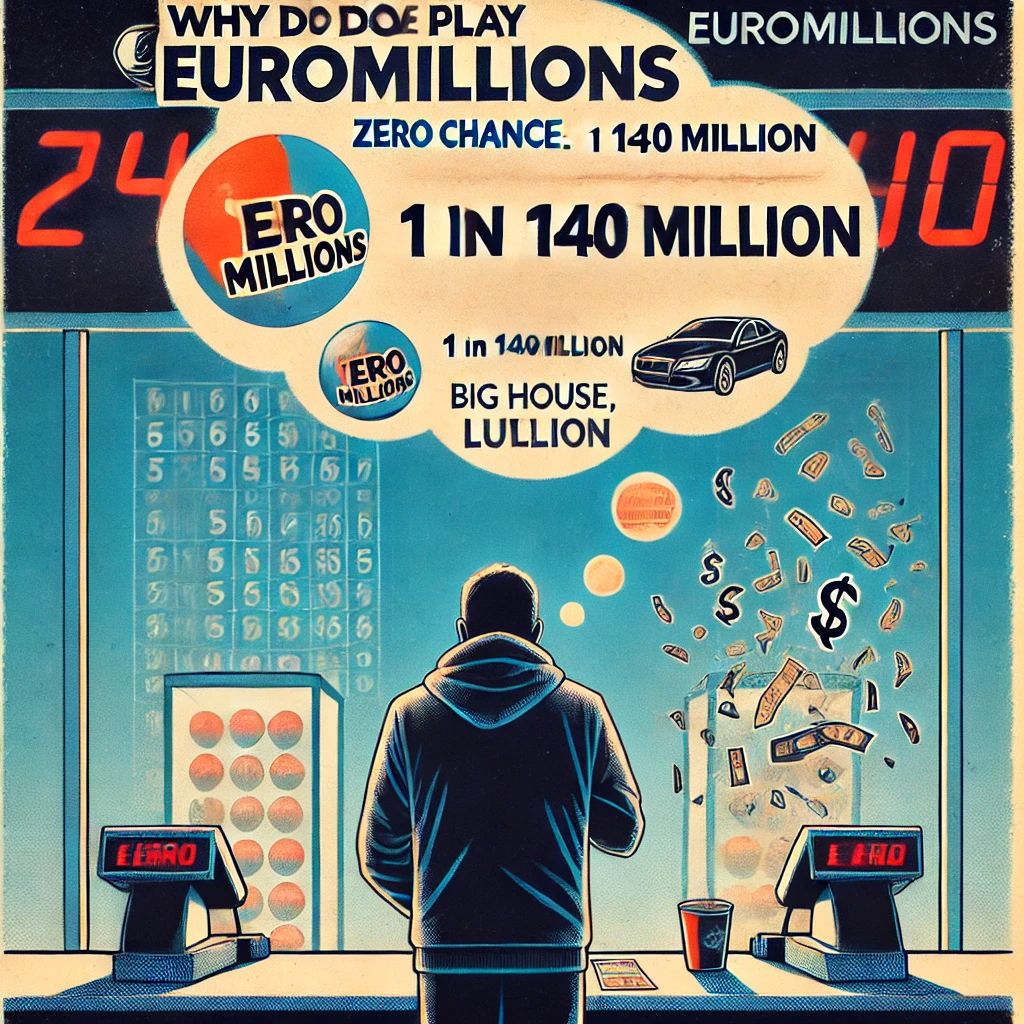
EuroMillions: A Game We Know We’ll Never Win, But We Still Play
Most of us have heard of EuroMillions, one of the biggest lotteries in Europe, promising astronomical jackpots and fairy-tale riches. Although the odds of winning the main prize are incredibly small – about 1 in 140 million – people across the continent regularly buy tickets. What drives us to bet money on something we statistically know we won’t win? Why do we buy a ticket every week or month, even when we know the probability of winning is close to zero?
The Odds Are Not in Our Favor
EuroMillions has clear rules. Pick five numbers from 1–50 and two additional numbers from 1–12. If you manage to guess all the numbers correctly, you become the winner. But this combination of numbers creates a huge number of possibilities, meaning the chance of hitting the correct one is tiny. To put it into perspective, 1 in 140 million means you have about the same chance of being struck by lightning as winning the EuroMillions jackpot.
Yet, people keep playing. How is it that this improbability doesn’t deter us? The answer may lie in several factors, some of which are deeply rooted in human psychology.
The Psychology of Gambling: Why Do We Play Despite the Slim Chance?
Interestingly, even though people can rationally understand that their chances of winning are minimal, they are still influenced by certain psychological mechanisms that lead them to believe in the possibility of winning. One key factor is the “gambler’s fallacy” – the illusion that the more we play, the more likely we are to win. In reality, this is not true. Each ticket, each game is independent, and the odds of winning do not change, no matter how long we have been playing.
Another factor is the “illusion of control”. People feel that by selecting their numbers, they somehow have a degree of power or control over the outcome, even though it is entirely random. The feeling that they can influence their destiny leads players to keep coming back and trying again.
A significant role is also played by the “lack of alternatives”. For many people, gambling is a form of entertainment and excitement. They see it as a way to get rich quickly without working for it, which is an attractive idea. Even though they know the odds are against them, the small hope of winning is enough to motivate them to keep trying.
Gambling as Entertainment?
For many people, EuroMillions and other lotteries are simply a form of entertainment. It’s a way to give oneself a moment of hope, to imagine what they would do with a massive fortune. Buying a ticket for a few euros, thinking about how their life would look with millions in the bank, and then watching the draw – for some, it’s a ritual that brings joy.
However, gambling, whether in the form of lotteries, casino games, or sports betting, has its dark side. For some players, this form of entertainment can easily turn into a bad habit or even an addiction, where they lose control of their behavior and bet far more money than they can afford.
Who Profits from It?
While players risk their money, their chances, and hopes that one day they will succeed, the companies running gambling games earn billions. In the case of EuroMillions and other major lotteries, it is primarily the shareholders of these companies who benefit from the enormous revenues generated by ticket sales.
Most of the money from ticket sales does not go to the prizes but to the operating costs of the lottery companies, advertising, administration, and, of course, profit. While players hope for wealth, investors in the companies that run gambling games have already won their jackpot.
Interestingly, EuroMillions and similar games are often promoted as a way to contribute to charity or public projects. A portion of the lottery proceeds does indeed go to support public causes, such as education, sports, or culture. However, these contributions make up only a fraction of the total revenue, while the majority goes into the pockets of shareholders.
Gambling and Society
While many people see lotteries as harmless fun, it’s hard to ignore the fact that gambling has a negative impact on society. For some players, gambling can become a dangerous addiction that destroys their lives, relationships, and finances. Many people who become addicted to gambling face serious financial problems, leading them to borrow money, accumulate debt, or even engage in criminal activity to obtain funds for more bets.
Problem gamblers make up only a small percentage of all participants, but their situation is serious and often requires professional help. It’s important for people who feel that gambling is controlling their lives to seek help and consult with addiction specialists.
Conclusion
For many, EuroMillions symbolizes hope for quick wealth. Even though the odds of winning are minuscule, people keep buying tickets and dreaming of a better future. Unfortunately, while some people see gambling as innocent entertainment, others become its victims and pay a high price for their dreams.
While we, the players, invest money with little chance of return, the real winners are those who run the gambling. The shareholders and owners of these companies make billions off the hopes and dreams of people who bet every week on their chance to change their lives.
If you play gambling games, always remember that it’s primarily a form of entertainment, not a guaranteed path to wealth. And if you find that the game is controlling you, don’t hesitate to seek help – because gambling, as the name suggests, is always a risk.
